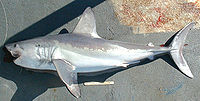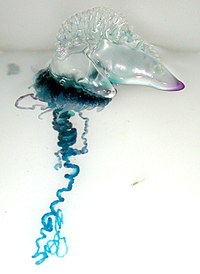
Stomach contents and stable isotopes analysis indicate Hemimysis anomala in Lake Ontario are broadly omnivorous
Sign Up to like & getrecommendations! Published in 2018 at "Journal of Great Lakes Research"
DOI: 10.1016/j.jglr.2018.03.003
Abstract: Abstract Hemimysis anomala is a recent invader to North American aquatic ecosystems and is spreading rapidly throughout the Great Lakes region. This is the first littoral mysid in the North American Great Lakes; and, as… read more here.
Keywords: hemimysis anomala; hemimysis; lake ontario; stomach contents ... See more keywords

Heavy metals in fish tissues/stomach contents in four marine wild commercially valuable fish species from the western continental shelf of South China Sea.
Sign Up to like & getrecommendations! Published in 2017 at "Marine pollution bulletin"
DOI: 10.1016/j.marpolbul.2016.10.040
Abstract: The concentrations of heavy metals (Cd, Pb, Cr, Ni, Cu and Zn) were determined in four commercially valuable fish species (Thunnus obesus, Decapterus lajang, Cubiceps squamiceps and Priacanthus macracanthus), collected in the western continental shelf… read more here.
Keywords: valuable fish; stomach contents; western continental; fish species ... See more keywords

Description of buoyant fibers adhering to Argonauta nouryi (Cephalopoda: Argonautidae) collected from the stomach contents of three top predators in the Mexican South Pacific.
Sign Up to like & getrecommendations! Published in 2019 at "Marine pollution bulletin"
DOI: 10.1016/j.marpolbul.2019.04.016
Abstract: Argonauta nouryi Lorois, 1852 is an octopod that inhabits the holopelagic zone, the objective of this study was to describe the occurrence of buoyant fibers adhering to the body and mantle cavity of A. nouryi… read more here.
Keywords: stomach contents; fibers adhering; argonauta nouryi; buoyant fibers ... See more keywords

Are Virginia opossums really ecological traps for ticks? Groundtruthing laboratory observations.
Sign Up to like & getrecommendations! Published in 2021 at "Ticks and tick-borne diseases"
DOI: 10.1016/j.ttbdis.2021.101780
Abstract: Virginia opossums (Didelphis virginiana) are a common synanthrope in North America, and serve as host to many species of ectoparasites. Research on captive Virginia opossums estimated that opossums eat, on average, 5500 larval ticks (Acari:… read more here.
Keywords: really ecological; stomach contents; ticks tick; virginia opossums ... See more keywords

Stomach contents of the Early Jurassic fish †Lepidotes Agassiz, 1832 (Actinopterygii, Lepisosteiformes) and their palaeoecological implications
Sign Up to like & getrecommendations! Published in 2019 at "Historical Biology"
DOI: 10.1080/08912963.2019.1665040
Abstract: ABSTRACT Ginglymodian fishes formed one of the most dominant actinopterygian lineages during the Mesozoic, occurring in fully marine to freshwater depositional environments. However, although commonly preserved in Mesozoic strata around the world, there is little… read more here.
Keywords: stomach contents; contents early; jurassic fish; fish lepidotes ... See more keywords

Dietary palaeoecology of an Early Cretaceous armoured dinosaur (Ornithischia; Nodosauridae) based on floral analysis of stomach contents
Sign Up to like & getrecommendations! Published in 2020 at "Royal Society Open Science"
DOI: 10.1098/rsos.200305
Abstract: The exceptionally well-preserved holotype of the armoured dinosaur Borealopelta markmitchelli (Ornithischia; Nodosauridae) from the Early Cretaceous (Clearwater Formation) of northern Alberta preserves a distinct mass within the abdominal cavity. Fourteen independent criteria (including: co-allochthony, anatomical… read more here.
Keywords: early cretaceous; stomach contents; armoured dinosaur; dietary palaeoecology ... See more keywords

Feeding of Arapaima sp.: integrating stomach contents and local ecological knowledge.
Sign Up to like & getrecommendations! Published in 2020 at "Journal of fish biology"
DOI: 10.1111/jfb.14372
Abstract: The giant arapaima (Arapaima sp.) has been described as a fish of change in Amazonia due to its important role on conservation of floodplains, food security and income generation for rural communities. However, despite the… read more here.
Keywords: knowledge; water period; arapaima; stomach contents ... See more keywords

How Rare Are Argonautoidea Octopuses in the Mediterranean? New Data from Stranding Events, Stomach Contents and Genetics
Sign Up to like & getrecommendations! Published in 2023 at "Biology"
DOI: 10.3390/biology12030420
Abstract: Simple Summary This study reports the results of a multidisciplinary research on Mediterranean pelagic octopods belonging to the species Argonauta argo, Ocythoe tuberculata, Tremoctopus gracilis and Tremoctopus violaceus for the first time. The study area… read more here.
Keywords: tremoctopus violaceus; stranding events; tremoctopus; argonautoidea octopuses ... See more keywords